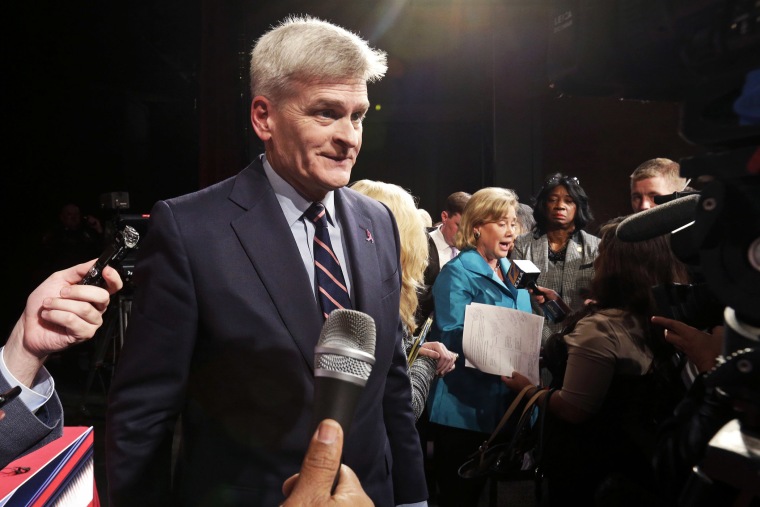As this week's developments have made clear, Republicans can't offer a coherent explanation for why they're scrambling to pass a regressive health care plan. Many GOP officials have no idea what it's in the Graham-Cassidy plan they intend to vote for, or what it would do to the system and the public.
But when asked to defend their intentions, Republican lawmakers can't just offer a blank stare. In fact, over the last few days, the GOP pitch has basically been reduced to five talking points, each of which is spectacularly unpersuasive.
1. Republicans have to keep a promise. Sen. Chuck Grassley (R-Iowa) said yesterday, "I could maybe give you 10 reasons why this bill shouldn't be considered. But Republicans campaigned on this so often that you have a responsibility to carry out what you said in the campaign. That's pretty much as much of a reason as the substance of the bill."
That's absurd. For one thing, it's ridiculous to think a vague campaign promise is as important, if not more so, than the real-world effects of overhauling the nation's health care system. For another, if Republicans "have a responsibility to carry out what [they] said in the campaign," they'd also be extending coverage to everyone, shielding Medicaid beneficiaries from cuts, and guaranteeing protections for Americans with pre-existing conditions. Instead, GOP officials appear desperate to break those promises without explanation.
2. The clock is ticking. Sen. Bill Cassidy (R-La.) said on Tuesday night, "We have a Sept. 30 deadline on our promise. Let's finish the job."
Um, no. As New York's Jon Chait responded, "Can you imagine being accused on national television of sponsoring a law that would hurt millions of people, and lying about its effects, and your response is “We have a deadline”? They are rushing to enact massive, permanent changes to the health-care system because of a legislative deadline? What if you said a used car was dangerously unsafe and lacked any of the promised features, and the salesman’s response was to tell you it’s the end of the month and he has a sales quota to meet?"
3. Campaign priorities trump public priorities. Sen. Pat Roberts (R-Kan.) said this week, in reference to health care policymaking, "If we do nothing, I think it has a tremendous impact on the 2018 elections. And whether or not Republicans still maintain control and we have the gavel."
This is madness. Republicans have to put Americans' health security at risk in order to stay in power? Sure, I understand the underlying argument -- if GOP lawmakers do nothing on this issue, the failure will make them look bad -- but that's not a case for passing a bad bill.
4. States that rejected Medicaid expansion through the ACA must be rewarded. Graham-Cassidy backers, including Lindsey Graham and Bill Cassidy themselves, have spent much of the week saying it's not "fair" that Medicaid expansion states receive more federal funding than states that refused to expand Medicaid. The current Republican legislation is therefore necessary, the argument goes, to create some sense of equality.
In other words, states that turned down federal funds should be rewarded, while states that did the right thing should be punished. This is so plainly foolish, I'm amazed an elected senator would repeat the argument out loud. If MSNBC offered a benefit to everyone on Rachel Maddow's team, and I turned down that benefit, would it make sense if I later whined that it's unfair that my colleagues received something that I didn't?
5. Single-payer must be stopped. Lindsey Graham, in particular, has made a spirited case in recent days that if his plan isn't adopted, the United States will eventually adopt a single-payer system. In fact, he's done his best to present it as a binary debate: either Graham-Cassidy passes, or we move to "Medicare for All."
What the South Carolinian and his allies don't seem to realize is that they have this entirely backwards: the more they try to destroy the current system, strip more Americans of their coverage and protections, and prove that sweeping legislation can be approved without scrutiny or due diligence, the easier it will be for single-payer advocates to advance their alternative in the future.
The insurance industry made this explicit yesterday, saying the Republican proposal inadvertently makes "Medicare for All" more likely, not less.
GOP officials have had seven years to create a compelling sales pitch on health care. That they've failed so spectacularly doesn't inspire confidence in their regressive plan.
